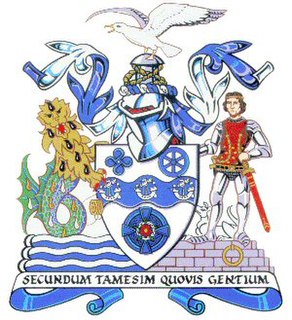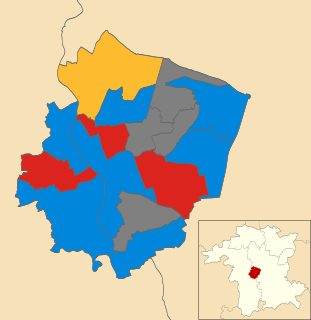The 2007 Thurrock Council election took place on 3 May 2007 to elect members of Thurrock Council in Essex, England. One third of the council was up for election and the Conservative party lost overall control of the council to no overall control. [1]

Thurrock Council is the local council for the borough of Thurrock in Essex, England. Since 1997, Thurrock has been a unitary authority, combining the functions of a non-metropolitan county with that of a non-metropolitan district. The other such authority in Essex is Southend-on-Sea. It is a member of the East of England Local Government Association.

Essex is a county in the south-east of England, north-east of London. One of the home counties, it borders Suffolk and Cambridgeshire to the north, Hertfordshire to the west, Kent across the estuary of the River Thames to the south, and London to the south-west. The county town is Chelmsford, the only city in the county. For government statistical purposes Essex is placed in the East of England region.

England is a country that is part of the United Kingdom. It shares land borders with Wales to the west and Scotland to the north-northwest. The Irish Sea lies west of England and the Celtic Sea lies to the southwest. England is separated from continental Europe by the North Sea to the east and the English Channel to the south. The country covers five-eighths of the island of Great Britain, which lies in the North Atlantic, and includes over 100 smaller islands, such as the Isles of Scilly and the Isle of Wight.
Contents
The Conservatives, Labour and British National Party (BNP) contested all 16 wards which were up for election. In total 55 candidates stood in the election including 6 Liberal Democrats, 3 from the United Kingdom Independence Party, 2 independents and 1 candidate from the Independent Working Class Association. Anti-social behaviour, recycling and cleanliness were seen as major issues by the parties, [2] on a council which was seen as a top Labour target. [3]
The Labour Party is a centre-left political party in the United Kingdom which has been described as an alliance of social democrats, democratic socialists and trade unionists. The party's platform emphasises greater state intervention, social justice and strengthening workers' rights.
The British National Party (BNP) is a far-right, fascist political party in the United Kingdom. It is headquartered in Wigton, Cumbria, and its current leader is Adam Walker. A minor party, it has no elected representatives at any level of UK government. Founded in 1982, the party reached its greatest level of success in the 2000s, when it had over fifty seats in local government, one seat on the London Assembly, and two Members of the European Parliament.

The Liberal Democrats are a liberal political party in the United Kingdom. They presently have 11 Members of Parliament in the House of Commons, 96 members of the House of Lords, and one member of the European Parliament. They also have five Members of the Scottish Parliament and a member each in the Welsh Assembly and London Assembly. The party reached the height of its influence in the early 2010s, forming a junior partner in a coalition government from 2010 to 2015. It is presently led by Vince Cable.
The British National Party put up candidates in every ward, for the first time. [4] However, they secured no seats despite claiming that they were picking up votes from right wing Conservative supporters disaffected with David Cameron, particularly in middle class areas. [5] In the West Thurrock and South Stifford ward, Ken Daly stood for the BNP in protest at the treatment of his son's killer. [6]

David William Donald Cameron is a British politician who served as Prime Minister of the United Kingdom from 2010 to 2016. He was the Member of Parliament (MP) for Witney from 2001 to 2016 and Leader of the Conservative Party from 2005 to 2016. He identifies as a one-nation conservative, and has been associated with both economically liberal and socially liberal policies.
The results of the election saw the Conservatives lose their overall majority on the council after losing 3 seats and only gaining one. The Labour party made a net gain of two seats, while the BNP came second in 6 seats after a strong rise in votes. [7] Overall turnout was 31% and after the election the balance of power on the council was held by 3 independents. [8]

Voter turnout is the percentage of eligible voters who cast a ballot in an election. Eligibility varies by country, and the voting-eligible population should not be confused with the total adult population. Age and citizenship status are often among the criteria used to determine eligibility, but some countries further restrict eligibility based on sex, race, or religion.
After the election, the composition of the council was:
- Conservative 24
- Labour 22
- Independent 3 [9]











